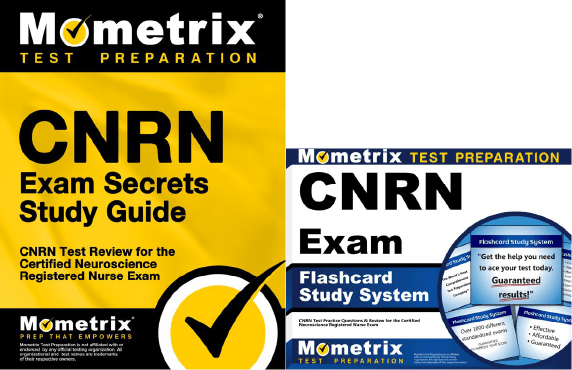If you need help studying for the Certified Neuroscience Registered Nurse (CNRN®) exam or just want some more information about what the exam is like, you’ve come to the right place.
Click below to take a free CNRN practice test!
Exam Eligibility
Before you can register to take the CNRN test, you’ll need to have a current RN license and at least a year of full-time neuroscience nursing practice within the last three years.
What’s on the Exam?
First, let’s talk about the questions on the exam. There are 220 multiple-choice questions total, but only 200 of the questions will count toward your score. Why is that?
The 20 unscored questions on the exam are called “pretest” questions. These are added to the exam to determine if they’re good enough questions to add to future versions of the test.
The trick is that you won’t have any way of knowing which questions are scored and which ones are pretest questions. They will appear just like the scored questions throughout the test.
The time limit for the exam is 4 hours. There aren’t any scheduled breaks, but you’re free to take restroom breaks as needed.
Let’s take a closer look at the different sections of the exam.
1. Trauma
30 scored questions
- Traumatic brain injury
- Hematoma/hemorrhage
- Spinal cord injury
2. Cerebrovascular
50 scored questions
- Ischemic stroke
- Hemorrhage stroke
- Transient ischemic attack
- Cerebral venous sinus thrombosis
- Vascular anomalies
- Anoxic injury
3. Tumors
26 scored questions
- Neuroepithelial Tissue
- Cranial and Spinal Nerves
- Meningioma
- Hematopoietic
- Endocrine
- Metastatic
- Spinal cord tumors
4. Infection and Immune Complications
22 scored questions
- Abscesses
- Meningitis
- Encephalitis
- Amyotrophic lateral sclerosis
- Bell’s palsy
- Demyelinating polyneuropathy
- Multiple sclerosis
- Myasthenia gravis
- Encephalopathies
5. Neurodevelopmental Conditions
10 scored questions
- Cranial/cerebral defects
- Chiari malformation
- Hydrocephalus
- Congenital brain and spinal cord anomalies
6. Neurological Disorders
62 scored questions
- Partial, generalized, status epilepticus, and non-epileptic seizures
- Headaches
- Hydrocephalus
- Pseudotumor cerebri
- Acute, chronic, and neuropathic pain
- Dementia
- Delirium
- Movement disorders
- Chemical dependency
- Degenerative spine disease
- Peripheral nerve injury
How to Register
To get started, you’ll need to submit an application on the ABNN website. The application will ask you for your contact information and any documentation to prove your eligibility (among other things).
When you submit the application, you’ll also need to submit the application fee, which is $400. AANN members pay a discounted price of $300.
Exam Scores
The test is scored using a scaled scoring method. Here’s how it works:
For every question you answer correctly, you get one point added to your raw score. At the end of the test, your final raw score will be converted to a scaled score. This scaled score will range somewhere between 100 and 300.
The reason your raw score is converted to a scaled score is because everyone who takes the test is given a slightly different set of questions. Since everyone has a different arrangement of questions, and because some questions are harder than others, converting your raw score to a scaled score ensures a more even playing field.
Retaking the Exam
If you didn’t get a passing score on your first try, that’s okay! You can schedule to retake the test during the next testing period.
Keep in mind that you will have to pay the full testing fee every time you retake the test.
FAQs
How many questions are on the CNRN exam?
The exam contains 220 questions.
What is the time limit for the CNRN exam?
The exam is timed at 4 hours.
What is the passing score for the CNRN exam?
You’ll need to get a final scaled score of at least 200 to pass.
How much does the CNRN exam cost?
The testing fee is $400 (AANN members pay $300).
CNRN is a registered trademark of American Board of Neuroscience Nursing, which is not affiliated with Mometrix Test Preparation and does not endorse this page.



 CNRN Study Guide
CNRN Study Guide CNRN Flashcards
CNRN Flashcards